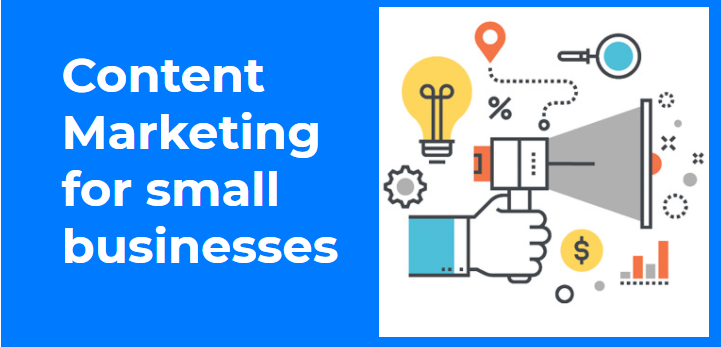What is Content Marketing?
Content marketing is a strategic process for creating, planning, distributing, publishing, and sharing content with the target audience.
It is a consistent flow of content through which relevant and valuable concepts are targeted to a specific group audience.
Ultimately, the core objective is to drive successful customer action and boost brand awareness.
45% of B2B Customers read at least three different content before reaching a sales guy.
77% of companies use content marketing as their marketing strategy, and 94% of marketers use social media for their content distribution.
70% of marketers are actively investing in content marketing.
In total, 78% of companies have a team of content specialists.
Video content marketing is the most commonly used format, including promotional videos and brand storytelling.
68% of marketers are interested in investing more in 2023-2024.
How Content Marketing helps small businesses
Content creation for small businesses is more beneficial in marketing, and as a strategy, it reduces cost, time, and other promotional resources.
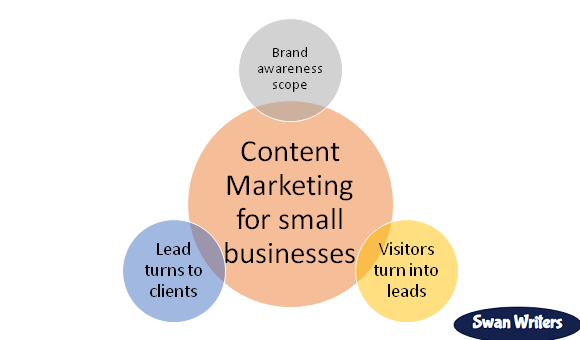
Content marketing is a unique marketing strategy for small businesses.
It is helpful because:
- Content Marketing drives increased brand awareness and high conversion rates.
- It is necessary to make money from the online platform and stand distinctively away from the crowd.
- Content Marketing is 55% Cheaper than other traditional marketing strategies
- Content Marketing helps businesses get 6x more Leads.
- Content Marketing helps a small business to position itself as an authority figure in the industry.
- 70% of people read blogs regularly, and 60% of people turn into customers getting a recommendation from a blog.
Benefits of Content Marketing include
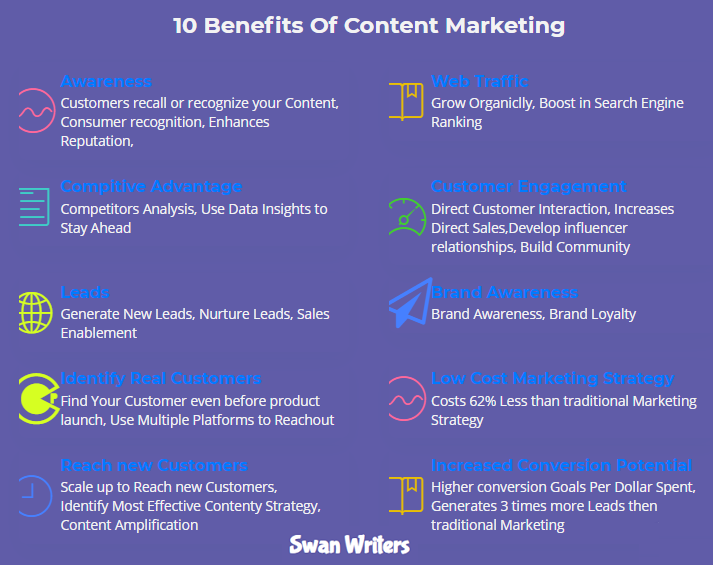
A Definite Content Marketing Guide for Small Businesses
Content Marketing is affirmative for small businesses. Some Important and simple steps are enough to make the strategy a success.
These include:
- Creating helpful and informative content that helps enrich lives from a reader’s perspective.
- Distributing the contents through specific channels
- Sharing the content with social media platforms and encouraging others to do the same.
- The success of content marketing is measured by the web traffic generated by these content marketing strategies.
These key steps will eventually increase the audience’s growth and ensure trust among them.
1. Define Your Content Marketing Objectives
The objectives of Content Marketing for small businesses must be:
- Educating new customers about the range and quality of products or services provided
- Illustrating the story of the company, its formation, and primary objectives toward customers
- Positioning the business among the experts
- Generating impressions across social media platforms
- Minimizing the bounce rate of the website when linking to relevant landing pages
2. Expose your business to Target Audience
Exposing the business to a defined audience is one of the critical aspects of Content Marketing.
Based on the enterprise, the content should be crafted with a specific message to bring value to your business.
Various social media platforms and other strategies can be used to expose a business properly to the target audience.
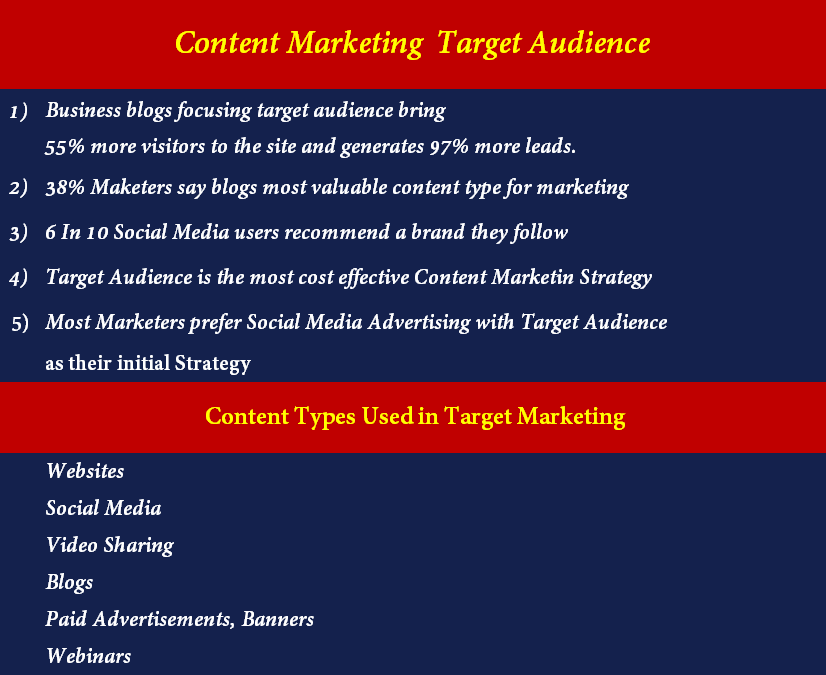
Find your first customer
There is no one-answer-fits-all strategy for finding the first set of customers through content marketing.
Today, many mediums and methods are used for marketing strategies.
Well, all of them lead to a few basic steps, which are:
- Knowing your audience.
- Mapping the content as per the pain point.
- Using relevant content for that particular problem.
- Mapping the content to the buying cycle of the people suffering from the issues.
- Find out the best format.
- Figuring the best content channels.
- Distribute your content in the market.
Create Small Conversion Goals
Things can only be achieved in stages. Therefore, it’s wise to set up small conversion goals to win the race when summed up and this will help in aiming for a particular destination to create a bigger picture in the future.
Most small businesses skip the small tests and eye for bigger ones. However, it only leads to sailing in a constant circling movement in the industry.
Engage with Customers
Engagement with customers helps in ensuring a healthy relationship with the business.
This can be done by prioritizing their personal preferences and posting content on media platforms that target any recent activity or occurrence.
Ensure that the incident drags relevancy to your content so that the bridge between your business and potential customers becomes more robust and neater.
3. Create Content for Lead Nurturing (Lead Generation)
Producing qualified leads can be made easier with inbound marketing. It helps the audience when you provide the best answers to a problem.
However, things can become complicated regarding winning value in the age of intense competition. Well, this can be achieved by maintaining consistency when publishing the content.
- Create Your Business Brand Identity
It’s pretty simple! Content Marketing helps in portraying the story of your business.
It is the story on which brand awareness is based.
Content Marketing is an incredible and effective marketing tool for small businesses.
All you need is storytelling, but in a different way and with a touch of smartness. Make sure to connect the story with people’s lives to create successful branding.
4. Create Product related content.
Product-related content has particular importance when it comes to content marketing.
If the content is tuned as per the Product’s objective and awareness, there’s no meaning in striking a pose with content marketing strategies.
According to recent statistics, most consumers research the Internet to find the best solutions, services, or products that suit their needs.
Therefore, if the content that you have created needs to include the information required by the target audience, your business is staying away from a possible selling point.
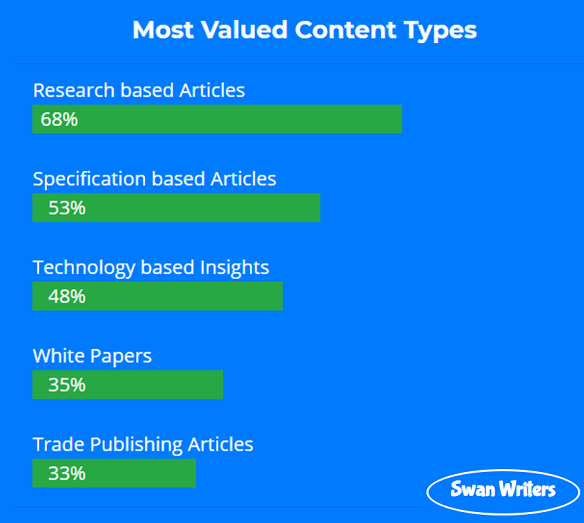
Create Content for Customer Problem Solving
Think not from a seller’s perspective but instead have a buyer’s eye.
In this case, your content should be tuned so that they become helpful for the audience.
People look for web platforms whenever they are restricted from finding a suitable answer.
If your content serves this problem and gives them peace of mind, you become the winner through content marketing strategies.
Therefore, lay the path to your business through problem-solving content rather than directly coming to the point of selling.
5. Improve Organic Search and Visibility
Organic traffic provides a competitive edge on the digital orb of Google.
- Properly optimized content can improve organic search and, eventually, visibility.
- Good quality content is required for this purpose, especially regarding more clicks and site authority.
- Even if the contents are appropriate, failure to improve the organic search will not lead your information to the correct set of customers.
Therefore, quality contents are equally important with organic searches to increase brand awareness of your business.
6. Create Sharable Content -Improve Social Visibility
Shareable content is a crucial strategy for a practical content marketing approach.
It helps in impacting crucial off-site signals that lead to the improvement of organic search rankings.
This includes customer engagements, backlinks, and brand awareness.
Shareable contents encourage customers to get more engaged with the brand and emboss the name in their hearts and minds.
It automatically prompts them to inform and include other people. If you want to create such content, make sure to have:
- Emotional attachment
- Trending matters
- Tied to identity
- Valuable information
7. Measure your content marketing
Measuring the effectiveness of content marketing can be either simple or complicated, based on your personal choice.
They are not mere numbers that stand presentable to the management.
For example, the effectiveness of content marketing can be based on the following:
- Figuring out the source of subscribers
- Figuring out the topics that lead to your business
- Figuring out the percentages of opt-out sources
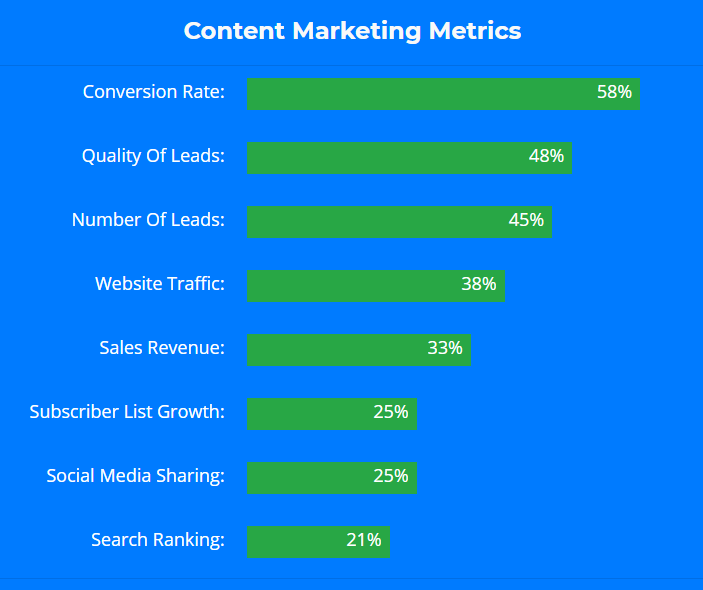
Measure your Conversion Rate
Measuring your conversion rate will give you the performance of your content marketing strategy, its tool of measurement of success for your content.
It can be an excellent tool for discerning the overall performance to increase marketing strategies’ effectiveness and boost website traffic.
It is essential to track them to calculate the conversion rate.
There are various analytics and advertising platforms through which conversion rates can be tracked and measured.
If you can understand the conversion rates, the future content marketing strategy will be apparent to you, and in due course, choosing the topics and sources of content can be precise.
Update your content to the latest. It is essential to use content that matches the newest topic for most of the audience.
An improved freshness can be achieved by just updating the old content. When Google goes through your newly created content, your business can experience a spike in traffic.
Hence, the trim work is always worth it!
Frequently updating the content forces the search engine to stop by your site, and frequent screening gives an opportunity of achieving higher rankings from content marketing.
Update Customers with new releases
Similar to the importance of updating your content, updating the customers about new releases is pivotal.
Having a company blog is the best tool for effective communication with customers. It will help let your customers know the work you put in and the improvement introduced through the products.
Updating your customers at specific intervals helps in building a healthy relationship. The significant advantages are:
- Faster and precise feedback
- More automation
- Monitoring real-world metrics
- Appropriate handling of intermittent bugs
- Smaller batches
The feedback provided by the customers can be an excellent source for fixing minor to significant issues with the continued usage of the products.
Update your customer with the Latest Features
It is undoubtedly an exciting time for your business to promote and launch new features to customers.
It is more than a basic necessity for the business. Updating your customers is a professional and ethical way of performing a successful business.
This can be done through:
- Emails
- In-app messages
- Writing blog posts
- Creating training courses
- Initiating a webinar
Updating the customers with the latest features will provide them with many options.
These are particularly great for choosing a range of variety and quality. Coming up with the latest features helps a business to build on customer loyalty and trust.
Keep Your Website Fresh
Google algorithms use various types of freshness metrics to determine the ranking of your website.
The freshness score can degrade if the site has not been updated longer. Also, the amount of changes done is tracked on which the freshness score is determined.
To simplify it, keeping up with fresh content increases visitors’ engagement, which is crucial in Search Engine Optimization strategies.
It is like getting a new pair of dresses for your site to change the look.

